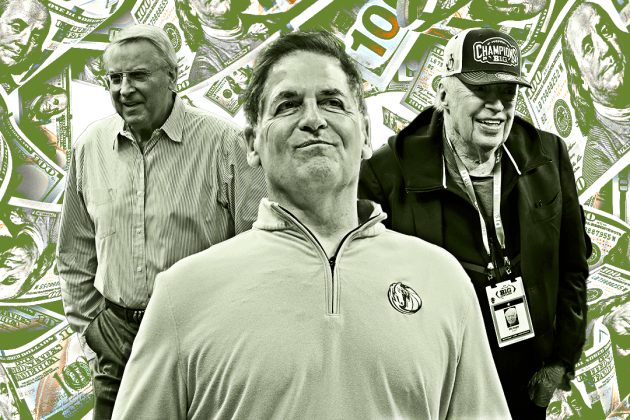
The 2024-25 College Football Playoff field features pairings with some numerical disparities, like the 14,000 student enrollment of Notre Dame versus the 48,000 of Indiana, the 32,000 stadium capacity of visiting SMU compared to the 107,000 arena of host Penn State, and the endowment of the University of Texas ($20 billion) compared to Clemson ($1 billion).
But there’s some commonality among all dozen playoff teams: They all have at least one very wealthy backer. And in the NIL and transfer portal era—where programs like the Hoosiers can go from cellar-dwellers to title-hunters in one smart-spending offseason—those backers are arguably more important than ever.
More from Sportico.com
Sportico took a look at some of the wealthiest, highest-profile boosters of the athletic departments of the schools playing for the football national title over the next four weeks, using publicly available news and school reports. Is it scientific? Not at all. But when has college sports been rational?
Southern Methodist Univ. – Gerald J. Ford ($2.7 billion net worth. All wealth estimates are from Forbes)
The financial services magnate (not the ex-president) made his name turning around distressed banks, making a mint reviving Golden State Bancorp with Ronald Perelman (the investor, not the actor). The pair sold the bank to Citigroup for $6 billion in stock in 2002. Before and since, Ford’s been a consistent supporter of the Mustangs, who named their Dallas stadium after the billionaire. He now runs Hilltop Holdings, a conglomerate of financial services businesses with a market cap of $1.9 billion.
Ohio State Univ. – Les Wexner ($7.9 billion)
The Dayton, Ohio-born retailer is best known for bringing Victoria’s Secret and Bath & Body Works to malls near you. A long-time supporter of OSU and trustee of the medical school, his wife made a donation to name the Buckeyes’ football complex after Les in 2007 as a surprise gift. It is one of a few facilities at Ohio State with the Wexner name on it, though his long friendship with deceased sex trafficker Jeffrey Epstein has colored the honor for some in the Columbus community.
Indiana University at Bloomington – Mark Cuban ($5.9 billion)
A sports fanatic, Cuban made his fortune founding Broadcast.com with fellow IU alum Todd Wagner in the 1990s, offering the then-novel idea of streaming sports games over the internet. After selling it to Yahoo at the peak of the dotcom bubble, Cuban used some of his billions to buy the NBA’s Dallas Mavericks. He’s given the Hoosiers’ athletic department various forms of support, including millions to build a student-run broadcast facility in 2015 and, more recently, NIL deals through Campus Ink, an apparel startup he invested in.
University of Texas at Austin – Robert Rowling ($10.9 billion)
Rowling made his fortune first with his father as an oil wildcatter, then extended into hospitality—his TRT Holdings has long owned luxury chain Omni Hotels, at which the family man forbade adult pay-per-view offerings. COVID led him to shake up his holdings a bit—selling pandemic loser Gold’s Gym while investing $500 million into pandemic-boosted golf courses. A frequent donor to the Austin school and athletics, Rowling got some notice two years ago lending his support to other sports donors wishing to maintain The Eyes of Texas as the school fight song when students wanted it dropped given past usage of the song in blackface performances. The CFP holds a potential rooting conflict for Rowling: While he got his bachelor’s degree at Texas, his law degree is from SMU.
University of Tennessee – Jimmy Haslam ($8.5 billion)
Owner of the NFL’s Cleveland Browns and the Columbus Crew of MLS, Haslam has a long association with the Volunteers. Jimmy was captain of the 1952 team that went to the Cotton Bowl and has the practice football field named after him in Knoxville. He and his wife Dee have given over $120 million to the university, with millions directed to athletics as well as the music school and the business school, which now bears their name. Haslam’s support of the Vols hasn’t been without its bumps: The heavily influential Haslam wanted Greg Schiano as football coach in 2017, a deal the school backed out of after an uproar related to Schiano coaching at Penn State during the time Jerry Sandusky was sexually abusing boys there.
University of Notre Dame – Jay Jordan (net worth not estimated)
Though his wealth isn’t estimated by Forbes, Jordan is a member of the Giving Pledge, Warren Buffett and Bill Gates’ club of billionaires who pledge to give away at least half their wealth in life or at death. He founded and still owns the majority of TJC, a private equity firm with $30 billion in assets under management, including a stake in Bruin Capital. He’s Notre Dame’s biggest donor ever, with more than $150 million in lifetime donations, including to athletics. One son played on the Irish football team at the turn of this century.
Penn State – Terry Pegula ($7.6 billion)
The 1973 PSU grad made his fortune fracking natural gas in Pennsylvania. When he sold the business for $4.7 billion in 2010, he bought the Buffalo Bills and Sabres. While Pegula and wife Kim are best known in Happy Valley for a gift of $88 million to push the Nittany Lions’ ice hockey program to the top tier of collegiate competition, one Penn State blog termed Pegula “the man who saved Penn State football” for writing a check in 2012 to boost the pay of then-coach Bill O’Brien to keep him from accepting an NFL coaching offer. O’Brien is credited with preserving the viability of Nittany Lions football in the aftermath of the Sandusky scandal, though he left a year later to be head coach for the NFL’s Texans.
University of Oregon – Phil Knight ($35.1 billion)
If there’s an athletics department booster ADs dream of, it’s the founder of Nike. Knight started the business at Oregon, where he ran track, and has given hundreds of millions of dollars to the school, helping turn the Ducks into a football powerhouse. “Uncle Phil,” as he’s known to the players, reportedly pledged “unlimited” NIL money this year to help the Ducks try to win the program’s first national championship. Undefeated and seeded No. 1 with a bye from this weekend’s tilts, Knight’s football title dreams are the closest to coming true they ever have been.
Arizona State University – Ira Fulton (net worth not estimated)
He’s the founder and owner of Fulton Homes, a residential housing developer that builds a about 1,000 homes a year. Not reported as a billionaire, his giving suggests he’s one: by 2005 he had given away about $265 million to charity already and was worth $425 million at the time, according to press reports reprinted on the homebuilder’s website. ASU has received more than $160 million in donations from Fulton, who has the engineering school in Tempe named after him. His disclosed support has been directed only to academics, not athletics, but without the school there’d be no Sun Devils football, right? Fulton has also given more than $70 million to BYU.
Clemson University – Dan Cathy ($10.8 billion)
A scion of the Chick-fil-A empire, Cathy didn’t attend Clemson, but at least one child did (the elder Cathy got his degree from Georgia Southern). Still, the chairman of the fast-food chain is one of 27 “Athletic Cornerstone Partners” who have contributed at least $2.5 million to the Clemson athletic department. Jim Brown, who owns tax consulting firm Synergi in South Carolina, appears to be the largest athletics booster for the Tigers, but it’s Cathy who students will know best: Chick-fil-A has three locations in Clemson, including inside the student center.
University of Georgia – Don Leebern Jr. (net worth not estimated)
Long cited as one of the nation’s most powerful college athletics boosters, Leeburn died this spring. Still, the late owner of a large liquor, wine and beer distributor left his mark on the Bulldogs. First, he was a starting lineman on the 1959 squad that won the SEC and that post-season’s Orange Bowl; he then was a long-time member of the university system’s board of regents. Leebern gave millions of dollars to athletics, including money for football facilities and endowing scholarships in gymnastics and football.
Boise State University – Allen & Billie Dee Noble (net worth not estimated)
The Broncos’ biggest boosters do so from beyond the grave. The estate of Allen and Billie Dee Noble gifted the school $25 million in October, which said it will use the money to support the athletics department. In true Idaho fashion, Allen Noble, who died in 2021, made his wealth in potatoes, mainly selling farm equipment but also founding two still-operating potato farms. Noble supported Boise State football long before the installation of blue turf, back to when school coaching legend Lyle Smith established the then-Boise Junior College as a football powerhouse in the 1950s and ’60s.
Best of Sportico.com
Sign up for Sportico’s Newsletter. For the latest news, follow us on Facebook, Twitter, and Instagram.
EMEA Tribune is not involved in this news article, it is taken from our partners and or from the News Agencies. Copyright and Credit go to the News Agencies, email news@emeatribune.com Follow our WhatsApp verified Channel




